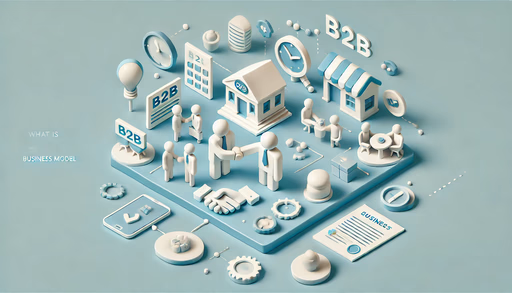What is the B2B (Business-to-Business)?

The business world operates in various models, each catering to different audiences and functions. One of the most prominent models is B2B (Business-to-Business), which revolves around transactions between businesses rather than between a business and individual consumers. This model powers industries like manufacturing, wholesale, SaaS (Software as a Service), and more.
In this article, we will explore what B2B (Business-to-Business) means, its characteristics, advantages, challenges, and how it differs from B2C (Business-to-Consumer).
Defining B2B (Business-to-Business)
B2B (Business-to-Business) refers to commercial transactions that take place between businesses rather than individual consumers. These transactions can include product sales, service provisions, software licensing, and bulk supplies. Unlike B2C, where businesses sell directly to consumers, B2B focuses on selling products and services to other businesses, which then use them to operate or resell.
For example, a software company providing cloud storage services to corporations or a manufacturer supplying auto parts to an automobile company are both examples of B2B transactions.
Key elements of B2B include:
- Large-scale transactions (bulk orders, long-term contracts).
- A longer sales cycle due to negotiations and approvals.
- Relationship-driven business strategies.
- Recurring purchases and partnerships.

Characteristics of the B2B Business Model
The B2B business model differs significantly from B2C in various aspects. Below are some key characteristics:
1. Larger Order Volumes: Unlike B2C, where consumers buy single products or small quantities, B2B transactions involve bulk purchases. Companies often buy raw materials, components, or wholesale goods in large quantities.
2. Relationship-Centric: B2B relationships are built over time through trust, reliability, and consistency. Companies work together long-term, ensuring mutual benefits. For example, a pharmaceutical company may have long-standing partnerships with suppliers of medical ingredients.
3. Complex Decision-Making Process: Unlike individual consumers who make quick buying decisions, B2B transactions involve multiple decision-makers, approvals, and budget considerations. This makes the sales cycle longer and more detailed.
4. Customization and Personalization: Many B2B businesses offer tailored solutions to meet specific client needs. A tech company, for instance, may customize software solutions based on a client’s business model and operational needs.
5. Pricing and Negotiations: Pricing in B2B is often customized, negotiated, and contract-based. Bulk orders and long-term relationships influence discounts and pricing structures, unlike fixed retail pricing in B2C.
Advantages of the B2B Business Model
B2B businesses come with numerous benefits that make them a preferred choice for many entrepreneurs and enterprises.
1. Higher Revenue Potential: B2B transactions often involve bulk purchases, leading to higher revenue per sale. Unlike B2C, where sales volume is higher but individual order values are lower, B2B deals involve fewer transactions but significantly higher order values.
2. Long-Term Client Relationships: Since businesses rely on stable suppliers and partners, customer retention in B2B is typically higher. Recurring contracts, long-term service agreements, and bulk purchasing lead to steady revenue streams.
3. Lower Marketing and Advertising Costs: B2B marketing focuses more on targeted outreach, referrals, and direct sales rather than expensive mass advertising campaigns. Companies often use networking events, conferences, and LinkedIn outreach to build relationships.
4. Scalability and Growth: B2B businesses often have better scalability since partnerships and bulk orders allow for strategic expansion. With long-term contracts in place, companies can plan for production, logistics, and workforce requirements effectively.
5. Competitive Edge Through Customization: Unlike B2C, where businesses often sell generic products to a wide audience, B2B companies can customize their offerings, ensuring higher value delivery and customer satisfaction.
How Business-to-Business Selling is Different
B2B sales differ significantly from B2C sales due to their complexity and the nature of their target audience.
1. Longer Sales Cycle: B2B purchases often require multiple approvals, budget considerations, and contract negotiations, making the sales cycle longer than B2C transactions, where impulse buying is common.
2. Relationship-Based Selling: B2B sales rely on long-term relationships and trust rather than one-time transactions. Companies engage in networking, follow-ups, and strategic partnerships to maintain clients.
3. Customized Solutions vs. Standard Products: While B2C focuses on selling standard products to a broad audience, B2B solutions are often customized to meet the specific needs of businesses.
4. Higher Emphasis on ROI (Return on Investment): Business clients make purchasing decisions based on how a product or service will impact their operations, efficiency, and profitability, unlike B2C buyers who may buy based on emotions or trends.
Types of B2B Business Models
B2B businesses come in various forms, depending on their industry and function. Here are some common models:
1. B2B Product-Based Model: Companies manufacture or supply products that other businesses need. Examples include manufacturers of raw materials, machinery, and office supplies.
2. B2B Service-Based Model: These businesses provide professional services such as IT support, consulting, logistics, and financial services to other businesses.
3. SaaS (Software as a Service) Model: Many tech companies operate on a B2B SaaS model, offering cloud-based solutions like CRM, accounting, or cybersecurity services.
4. Wholesale & Distribution Model: Wholesalers purchase products in bulk from manufacturers and distribute them to retailers or businesses.
Challenges of B2B
Despite its advantages, B2B businesses face several challenges:
- Complex Sales Process: Requires long negotiations and multiple decision-makers.
- High Competition: Many industries have strong competitors offering similar products/services.
- Customer Acquisition Costs: B2B marketing and sales efforts are more expensive compared to B2C.
- Dependence on Relationships: A single lost client can significantly impact revenue.
B2B Companies Examples
Many globally recognized businesses operate in the B2B space. Some notable examples include:
- Microsoft: Provides enterprise software solutions like Microsoft Azure and Office 365 for businesses.
- Salesforce: A CRM platform used by companies for customer relationship management.
- Intel: Supplies computer processors to manufacturers like Dell and HP.
- Alibaba: A global B2B e-commerce marketplace connecting businesses with suppliers.
Business-to-Business (B2B) vs. Business-to-Consumer (B2C)
| Aspect | B2B (Business-to-Business) | B2C (Business-to-Consumer) |
| Target Audience | Other businesses and enterprises | Individual consumers |
| Sales Cycle | Longer, involves negotiations | Shorter, often impulse-based |
| Order Size | Bulk purchases, large transactions | Smaller, individual purchases |
| Marketing Approach | Relationship-based, direct outreach | Mass marketing, social media campaigns |
| Customer Retention | Long-term contracts, recurring sales | Less loyalty, one-time purchases common |
Why Should B2B Companies Use Peerbie?
B2B companies constantly seek ways to improve efficiency, collaboration, and customer engagement. Peerbie, a powerful business collaboration and productivity platform, offers a range of features tailored to B2B needs.
1. Enhanced Team Collaboration
Peerbie streamlines communication and project management, ensuring teams stay connected and work efficiently, regardless of location.
2. Improved Workflow Automation
With AI-driven task management, Peerbie helps businesses automate repetitive processes, reducing manual workload and increasing productivity.
3. Customer Relationship Management (CRM)
B2B companies rely on strong client relationships. Peerbie’s CRM tools help businesses manage leads, track interactions, and nurture customer connections effectively.
4. Data-Driven Decision Making
The platform provides analytics and insights, helping businesses make informed decisions based on real-time data.
5. Seamless Integration
Peerbie integrates with various business tools, making it easier for companies to adapt it into their existing workflows.
By leveraging Peerbie, B2B companies can boost productivity, improve team collaboration, and enhance customer management, ultimately leading to sustainable growth.

The B2B business model plays a vital role in the global economy, enabling businesses to access essential products, services, and technologies. With long-term relationships, high-value transactions, and customized solutions, B2B businesses provide unique advantages over B2C models. However, challenges such as long sales cycles and competition make it crucial for B2B businesses to innovate continuously.
By understanding the key characteristics, advantages, and challenges, businesses can optimize their B2B strategies for sustainable growth.


Unlock the freedom of buy Adderall online without prescrition Adderall
Online Without Prescription, your go-to source for accessible solutions!
Navigate a user-friendly platform offering authentic Adderall, crafted to support your energy.
Whether you’re managing daily challenges or aiming for clarity, our seamless service delivers discreetly with complete
privacy. Join for unlimited access to verified products, uplifting
your lifestyle anytime.
Why wait when you can streamline your routine with Buy Adderall Online Without Prescription?
Our extensive inventory connects you to safe products at affordable
prices, with express delivery to fulfill your demands.
Browse with assurance on our sleek platform, updated frequently to
ensure reliable stock. No barriers—just secure access to the boost you need.
Click now and redefine your focus today!